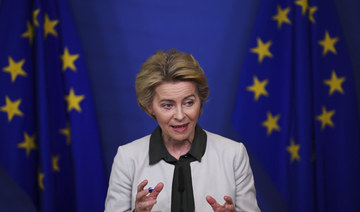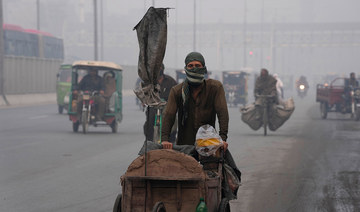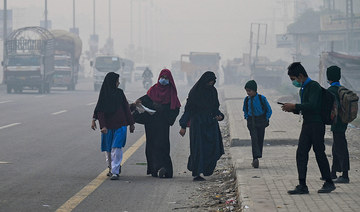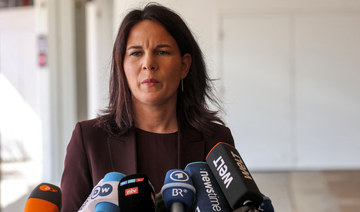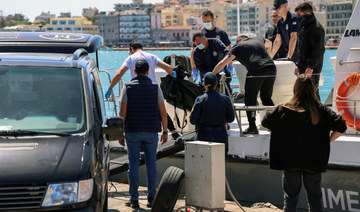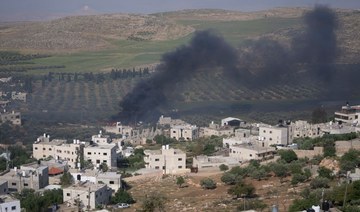MADRID: A major climate summit wrapped up in Madrid Sunday with a compromise deal that left little to show, prompting UN Secretary-General Antonio Guterres to lament a “lost opportunity” to act.
Almost a fortnight of COP25 talks just squeezed out hard-earned compromises from countries over a global warming battle plan that fell well short of what science says is needed to tackle the climate crisis.
“I am disappointed with the results of COP25,” Guterres said. “The international community lost an important opportunity to show increased ambition on mitigation, adaptation and finance to tackle the climate crisis.”
The summit’s final declaration “expresses the urgent need” for new carbon cutting commitments to close the gap between current emissions and the Paris treaty goal of capping temperature at below two degrees, host country Spain said.
“Today, the citizens of the world are asking for us to move ahead faster and better,” Carolina Schmidt, Chilean environment minister and President of COP25, told the closing plenary.
But Tina Eonemto Stege, climate envoy for the Marshall Islands, denounced the response as inadequate for facing an existential threat of rising sea levels.
“Unfortunately, the new text we adopted this morning does not reflect anything near what we would have wanted. It is the bare minimum and we regret that countries could not agree on a more ambitious text,” Stege said.
Green youth activist Greta Thunberg — named 2019 Person of the Year by Time magazine — on Friday slammed world leaders for “still trying to run away from their responsibilities” while demanding a “year of action” in 2020.
Following a year of deadly extreme weather and weekly protests by millions of young people, Madrid negotiators were under pressure to send a clear signal that governments were willing to double down.
The summit — moved at the last minute from Chile due to unrest — at times teetered on the brink of collapse as rich polluters, emerging powerhouses and climate-vulnerable nations groped for common ground in the face of competing national interests.
“Based on the adopted text, there is a glimmer of hope that the heart of the Paris Agreement is still beating,” Mohamed Adow, Director of Power Shift, said.
“But its pulse is very weak.”
Negotiators from nearly 200 nations came to Spain’s capital with the aim of finalizing the rulebook for the 2015 Paris accord, which enjoins nations to limit global temperature to below two degrees Celsius (3.6 Fahrenheit).
With the accord set to become operational next year, it had been hoped COP 25 would show the world that governments would be moved by protests, irrefutable science, and deadly storms and wildfires that marked 2019 to redouble their efforts.
But greater ambition — how far each country is willing to slash carbon emissions or assist less wealthy peers to do likewise — has largely failed to materialize, leaving some veteran observers aghast.
“Never have I seen such a disconnect between what the science requires and what the climate negotiations are delivering in terms of meaningful action,” said Alden Meyer, director of strategy and policy at the Union of Concerned Scientists and a 28-year veteran of the climate process.
“Most of the world’s biggest emitting countries are missing in action and resisting calls to raise their ambition.”
The push for strengthening voluntary carbon cutting plans is led by small-island and least-developed states, along with the European Union.
These have called out nations they see as blocking consensus — notably the United States, Australia and Saudi Arabia.
China and India, the world’s No. 1 and No. 4 carbon emitters, made it clear they see no need to improve on their current emissions reduction plans, which run to 2030.
These emerging giants chose instead to emphasize the historical responsibility of rich nations to lead the way and provide financing to poor countries.
“Major players who needed to deliver in Madrid did not live up to expectations,” said Laurence Tubiana, CEO of the European Climate Foundation and, as France’s top negotiator, a main architect of the Paris Agreement.
“But thanks to a progressive alliance of small island states, European, African and Latin American countries, we obtained the best possible outcome, against the will of big polluters.”
The summit was also meant to finalize a chapter on carbon markets in the Paris rulebook.
Instead, the focus now switches to next year’s COP 26 in Glasgow, when the true Paris deadline falls.
The US, which is leaving the Paris deal next year, was accused of playing spoiler on a number of issues.
This included so-called “loss and damage” funding to help disaster-hit countries repair and rebuild.
“The US has not come here in good faith,” said Harjeet Singh, climate lead with charity ActionAid.
“They continue to block the world’s efforts to help people whose lives have been turned upside down by climate change.”
Even if all countries implement their current plans under Paris, Earth is on course to warm more than 3C by 2100.
UN climate talks a ‘lost opportunity’, says Guterres
https://arab.news/5wqzz
UN climate talks a ‘lost opportunity’, says Guterres
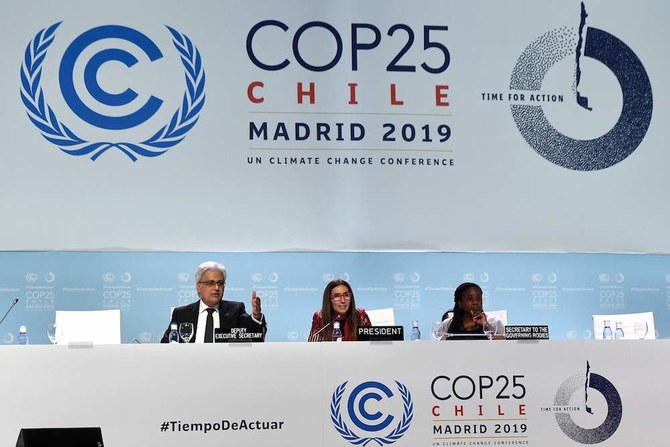
- Compromises were squeezed from countries over global warming battle plan but fell well short of what science says is needed to tackle emergency
- The lack of a strong outcome to reinforce the Paris accord raises the stakes for the next big climate summit
Finance firms urge ambitious action on plastic pollution

- Curtailing the estimated 400 million metric tonnes of waste produced every year is a crucial part of efforts to protect biodiversity, with microplastics found everywhere from the mountainous Himalayas to staple foods and even human blood
LONDON: A group of 160 financial companies on Friday urged governments to agree a treaty to end plastic pollution that would help spur private sector action, ahead of the next round of global talks in Canada.
The fourth meeting of the Intergovernmental Negotiating Committee on Plastic Pollution (INC-4) is due to be held in Ottawa next week to lay the groundwork for an eventual deal before the end of the year.
Curtailing the estimated 400 million metric tonnes of waste produced every year is a crucial part of efforts to protect biodiversity, with microplastics found everywhere from the mountainous Himalayas to staple foods and even human blood.
To help fix the problem, the finance firms, which include Britain’s biggest investor Legal & General Investment Management and Canadian pension investor CDPQ, called for a policy framework backed up by binding rules.
Among specific steps, the group called for the treaty to set an objective for all public and private finance to be consistent with the goal of eliminating plastic pollution, similar to that in the Paris climate agreement and the Kunming-Montreal global biodiversity framework.
It also called for companies to assess and disclose plastic-related risks and opportunities; clearer plastic-related policies and targets from governments in areas like waste creating and recycling; and for further private investment to be directed to ending plastic pollution.
“A clear transition pathway laid out in the Treaty will help leverage finance at scale for this massive task of ending plastic pollution worldwide,” said Anne-Sophie Castelnau, global head of sustainability at ING, one of the signatories.
Steve Hardman, CEO of Plastic Collective, an NGO which designed the world’s first plastic waste reduction bond alongside Citi and the World Bank, welcomed the support but called for business to provide more financial solutions.
In January, the World Bank issued the $100 million bond to finance plastic-reduction projects in Ghana and Indonesia. Investors will be paid a rate linked to plastic removal credits generated by the projects.
Finnish PM: EU should help end migrant influx from Russia

- European Commission President Ursula von der Leyen visits the border to assess security situation
HELSINKI: The EU should take measures to help Finland stop an influx of migrants via Russia, Finnish Prime Minister Petteri Orpo said.
Finland last year shut its long border with Russia amid a growing number of arrivals from countries including Syria and Somalia.
It accused Moscow of weaponizing migration against the Nordic nation and the EU, an assertion the Kremlin denies.
Finland’s government has closed eight of its nine checkpoints with Russia.
The only one that remains open is dedicated to rail travel and cargo trains mainly run through it.
“We are preparing our legislation, but we also need EU measures,” Orpo said, without elaborating, after visiting the Nordic country’s border with European Commission President Ursula von der Leyen.
Von der Leyen told the same press conference that the EU Commission was working closely with the migrants’ countries of origin, agreeing with Finland’s position.
“What we see is that a state is instrumentalizing poor people to put pressure on another state, so that is a clear security issue,” she said.
She said that the measures taken to deal with migrants from Russia must balance protecting the security of borders and international obligations.
Following Poland and Lithuania’s example on their borders with Belarus, the Finnish government is drafting legislation allowing border guards to block asylum seekers entering the country from Russia.
“We all know how (Russian President Vladimir) Putin and his allies instrumentalize migrants to test our defenses and to try to destabilize us,” von der Leyen told officials.
“Now Putin is focusing on Finland, and this is no doubt in response to your firm support of Ukraine and your accession to NATO.”
Von der Leyen and Orpo flew in a Finnish helicopter over the landscape of forests and towns on the border.
Von der Leyen is campaigning as a conservative European People’s Party bloc member for a second term in office as head of the EU’s powerful executive branch.
Security is a top EPP theme before the June 6-9 European Parliament elections.
Most of the migrants hail from the Middle East and Africa.
Most of them have sought asylum in Finland, a member of the EU and NATO with a population of 5.6 million.
Finland joined NATO in April 2023, ending decades of neutrality after the country’s defeat by the Soviet Union in the Second World War.
In March, Sweden also became a member of the trans-Atlantic alliance.
The move dealt a major blow to Putin, with a historic realignment of Europe’s post-Cold War security landscape triggered by Moscow’s offensive against Ukraine.
US sanctions ally of Israeli minister, entities backing ‘extremist’ settlers

- Move comes as West Bank sees some of its worst violence perpetrated by settlers against Palestinians since Gaza war
WASHINGTON: The United States on Friday imposed sanctions on an ally of Israel’s far-right national security minister and two entities that raised money for Israeli men accused of settler violence, the latest actions aimed against those Washington blames for an escalation of violence in the Israeli-occupied West Bank.
The sanctions, in addition to those already imposed on five settlers and two unauthorized outposts already this year, are the latest sign of growing US frustration with the policies of Israeli Prime Minister Benjamin Netanyahu.
The moves on Friday, which freeze any US assets held by those targeted and generally bar Americans from dealing with them, hit two organizations that launched fundraising campaigns to support settlers accused of violence and targeted by previous sanctions, the Department of the Treasury said in a statement.
The Biden administration’s moves against Israeli settlers have upset right-wing members of Netanyahu’s governing coalition who support the expansion of Jewish settlements and ultimately the annexation of the West Bank, where Palestinians envisage a future state.
They come as the complex relationship between Washington and its ally Israel is tested by the war in Gaza and as the Biden administration urges Israel to show restraint in responding to retaliatory strikes by Iran.
Washington sanctioned Ben-Zion Gopstein, founder and leader of the right-wing group Lehava, which opposes Jewish assimilation with non-Jews and agitates against Arabs in the name of religion and national security. Gopstein has said Lehava has 5,000 members.
State Department spokesperson Matthew Miller said members of the group had engaged in “destabilizing violence affecting the West Bank.”
“Under Gopstein’s leadership, Lehava and its members have been involved in acts or threats of violence against Palestinians, often targeting sensitive or volatile areas,” Miller said in a statement, warning of additional steps if Israel does not take measures to prevent extremist attacks amid an escalation of violence in the West Bank in recent days.
The European Union also said on Friday it had agreed to take sanctions against Lehava and other groups linked to violent settlers.
A spokesperson for Israel’s embassy in Washington did not immediately respond to a request for comment.
Gopstein, the most prominent Israeli figure targeted by US sanctions, is a close associate of and has family ties to National Security Minister Itamar Ben-Gvir, who himself lives in a West Bank settlement.
Ben-Gvir, like Gopstein, was a disciple of the late Meir Kahane, an ultranationalist rabbi whose Kach movement was listed by Washington as a specially designated global terrorist organization.
Ben-Gvir on Friday slammed what he called harassment against Lehava and “our dear settlers who have never engaged in terrorism or hurt anyone,” labeling the allegations against them a “blood libel” by Palestinian groups and anarchists.
“I call on Western countries to stop cooperating with these antisemites and end this campaign of persecution against the pioneering Zionist settlers,” Ben-Gvir said in a statement released by his office.
CROWDFUNDING
Since the 1967 Middle East war, Israel has occupied the West Bank of the Jordan River, which Palestinians want as the core of an independent state. It has built Jewish settlements there that most countries deem illegal. Israel disputes this and cites historical and Biblical ties to the land.
The Biden administration in February said settlements were inconsistent with international law, signaling a return to long-standing US policy on the issue that had been reversed by the previous administration of Donald Trump.
One entity targeted on Friday, Mount Hebron Fund, launched an online fundraising campaign that raised $140,000 for settler Yinon Levi, the Treasury said, after he was sanctioned on Feb. 1 for leading a group of settlers that assaulted Palestinian and Bedouin civilians, burned their fields and destroyed their property.
It said the second entity, Shlom Asiraich, raised $31,000 on a crowdfunding website for David Chai Chasdai, who the United States sanctioned for initiating and leading a riot that included setting vehicles and buildings on fire and causing damage to property in the Palestinian town of Hawara, resulting in the death of a Palestinian civilian.
“These types of enforcement actions against entities helping violent settlers evade US sanctions are what give sanctions teeth,” said Michael Schaeffer Omer-Man, director of research for Israel-Palestine at Democracy for the Arab World Now, a human rights group that has highlighted efforts by supporters to evade sanctions against settlers.
Hindu-Muslim divisions sway voting in Indian district scarred by deadly riots

- Villages are largely self-segregated by religion in and around Muzaffarnagar in the most populous Uttar Pradesh state
- Violent clashes broke out in 2013 after two Hindus stabbed Muslim youth to death, accusing him of harassing their sister
MUZAFFARNAGAR: Hindu-Muslim enmity made way for peace in an Indian district that saw deadly riots a decade ago but religious divisions still influence residents who voted on Friday in general elections in which Hindu nationalism is a key theme.
Villages are largely self-segregated by religion in and around Muzaffarnagar district, in the most populous northern state of Uttar Pradesh, but people say there is no longer tension between the majority Hindu and minority Muslim communities.
Violent clashes broke out here in 2013 after two Hindus stabbed a Muslim youth to death, accusing him of sexually harassing their sister. They were later beaten to death by a Muslim mob, which sparked riots that killed about 65 people, mostly Muslims, and displaced thousands.
Violence has not returned to the district known as the country's sugarcane-belt, but political divisions remain as Hindus typically vote for Prime Minister Narendra Modi's Bharatiya Janata Party (BJP) and Muslims for the opposition.
Modi's government has "controlled Muslims", said Ramesh Chand, a Hindu biscuit baker in Kairana city near Muzaffarnagar.
Critics accuse the nationalist BJP of targeting India's 200 million minority Muslims to please their hardline Hindu base - charges they deny.
Modi is widely expected to win a third term on the back of strong growth, welfare and his personal popularity despite some concern about unemployment, price rises and rural distress.
Chand said Modi had improved security in the region. "We can live in peace, whether or not we have jobs ... We can sleep with our doors open."
There were opposing views too.
In Jaula village, sugarcane farmer Mohammed Irfan, 50, said Modi's "high-handedness against Muslims" as well as unemployment and inflation were major reasons for him voting for the opposition Samajwadi Party.
Uttar Pradesh elects 80 lawmakers to the 543-member lower house of parliament, the most among all states, and a strong showing here is critical to the nationwide outcome.
Support for Modi was visible in Kutba Kutbi village, the epicentre of the 2013 riots.
Although there is "brotherhood" between the two communities now, nearly all Muslim families left the village after the riots, said Vinay Kumar Baliyan, 43, a farmer who said he supports Modi for promoting economic growth and raising India's stature globally.
But Irfan said Muslims are expected to vote in larger numbers this time as Eid celebrations this month brought many migrant workers and students home.
After Pakistan alert, WHO likely to issue wider warning on contaminated J&J cough syrup

- The UN health body said it puts out global medical product alerts to ‘encourage diligence’ by authorities
- The WHO this week sent out alert on five batches of contaminated cough syrup ingredients found in Pakistan
LONDON: The World Health Organization is likely to issue a wider warning about contaminated Johnson and Johnson-made children’s cough syrup found in Nigeria last week, it said in an email.
Nigeria’s regulator recalled a batch of Benylin paediatric syrup last Wednesday, having found a high level of diethylene glycol in the product during routine testing.
The contaminant, alongside another closely related toxin, ethylene glycol, has been linked to the deaths of more than 300 children in Cameroon, Gambia, Indonesia and Uzbekistan since 2022, though there is no evidence that these incidents are linked with the latest recalls.
The UN health body said it puts out global medical product alerts to “encourage diligence” by national authorities and was likely to do so in this instance, “subject to confirmation of certain details from parties.”
The recalled batch of Benylin syrup was made by J&J in South Africa in May 2021, although Kenvue now owns the brand after a spin-off from J&J last year.
J&J has referred requests for comment to Kenvue. In an emailed statement on Friday, Kenvue said it had carried out tests on the batch recalled by Nigeria and had not detected either diethylene or ethylene glycol.
“We continue to work closely with health authorities and the WHO and are engaging with NAFDAC to understand their test results, including verifying the authenticity of the sampled product, the testing methodology used, and results reported by the agency,” the statement added.
Since Nigeria’s recall, five other African countries have also pulled the product from shelves — Kenya, Rwanda, Tanzania, Zimbabwe and South Africa, where the drug was made.
South Africa’s regulator has also recalled another batch of the syrup, which is used to treat coughs, hay fever and other allergic reactions in children.
Diethylene glycol is toxic to humans when consumed and can result in acute kidney failure, although there have been no reports of harm in the latest incident.
RAW MATERIALS
In the 2022 cases, the contamination in the syrups came from the raw materials used by manufacturers in India and Indonesia.
The WHO said it was collaborating with both the manufacturer and regulatory authority in South Africa to investigate the Benylin paediatric syrup, and had information on the source of the ingredients used. Kenvue has previously said it tested its ingredients before manufacture.
The agency said the possibility that the syrup was counterfeit was also “under consideration as part of investigations.”
Earlier this week the WHO sent out a separate alert on five batches of contaminated cough syrup ingredients found in Pakistan that appeared to have been falsely labelled as Dow Chemical products.
It was the first alert the WHO has sent on excipients — elements of a medicine other than the active pharmaceutical ingredient — rather than finished products, the agency confirmed on Friday.
The batches of propylene glycol were contaminated with ethylene glycol.
“It was critical for WHO to also alert manufacturers that may have been procuring this material to exercise more caution,” a WHO spokesperson said by email.
Propylene glycol is not an ingredient in Benylin paediatric syrup, a Kenvue spokesperson said on Friday.



